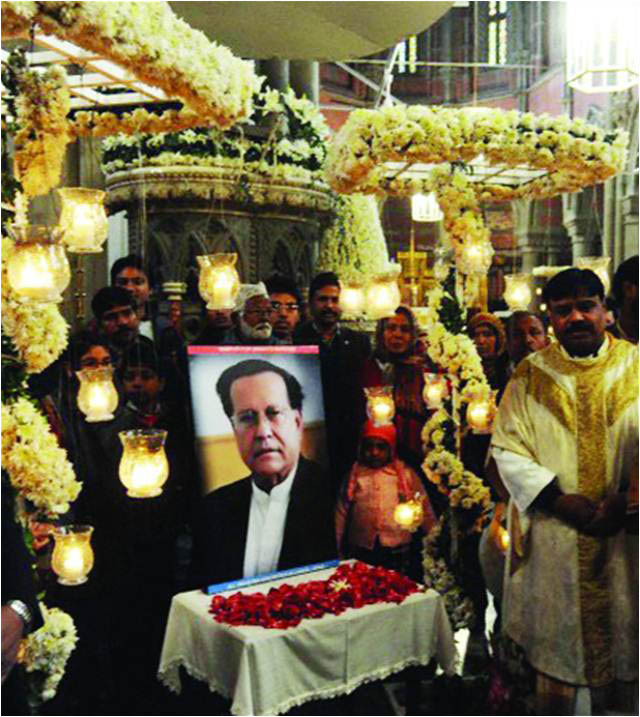After Salmaan Taseer? -by Tariq Bashir
Editor’s note: This blog cross posted from The Friday Times is a typical example of the “Blaming-the-victim” tactic of civil society which continues to goad PPP into losing more lives whilst sitting on the sidelines and often aligning itself with dubious media types. Contrary to the imagination of Tariq Bashir, Chairman PPP, Bilawal Bhutto Zardari has strongly and bluntly come out and condemned Taseer’s murder openly – at great risk. As for (Fake) Civil Society types, its limited activism to amend the Blasphemy Law stands is contradictary to its support to Pro-Taliban think tanks (Jinnah Institute) and Pro- Taliban Judiciary whose partisans showered petals on Taseer’s murderer! For a more balanced view on this, the reader can study https://lubpak.com/archives/tag/salmaan-taseer/page/2
Tariq Bashir remembers the late Governor of Punjab, who was slain two years ago for defending a poor Christian woman, and makes an impassioned plea for judicial discretion and religious tolerance in an increasingly hysterical Pakistan.

|
I vividly remember the New Year holidays spent in our ancestral village in central Punjab during the 1970s. Roaming the vast expanse of the flat fertile fields all day long seems far away now, and the surreal feeling of time standing still in the green idyll is hard to find. My uncle, himself a man of simple tastes, used to till his farmland with the help of a few Christian workers. There used to be such enjoyable banter and bonhomie on the tobacco and sugarcane farm that I preferred spending hours with my uncle and his Christian labourers during their weeding sessions to playing with my upper-caste Muslim cousins. Such was the society that existed in rural Punjab in those days. The issue of creed and the ensuing segregation is, in retrospect, far too subtle to notice when compared to the disturbingly pronounced levels of xenophobia to be found in today’s Pakistan. My insistence at times to eat with the labourers would be laughed off by one of the more humorous Christians, who would warn me that if I shared his lunch I would automatically become a Christian myself. Although the disturbing issue of untouchability seemed to fade in the momentary hilarity generated by the guffawing farmers, the underlying unease was not difficult to detect. (Intriguingly, my uncle would only smoke the labourer’s hookah when no one from the village was present, a classic example of acceptable levels of racism practiced by a society collectively but showing solidarity with the downtrodden in private.) A mere 20 kilometers away lies the village of Aasia Bibi, the low-caste Christian woman who challenged the order of prejudice and repression by quarreling with her tormentors, only to be booked and tried under Pakistan’s blasphmey law, a stick piously handed to the majority to “discipline” its disobedient minorities. (It is not unlike giving a neo-Nazi group space to persecute religious minorities via discriminatory legislation in today’s Europe. Imagine the outcry if the English Defence League of Britain were allowed to prosecute British Muslims, and Pakistanis in particular, for publicly wearing the shalwar kameez! ) Instead of empowering Pakistan’s minority communities (a euphemism for Christians, Ahmadis and Shias), the social chasm was deliberately widened by the state in the form of General Zia’s updated and expanded blasphemy laws. The centuries-old practice of untouchability was institutionalized and its pernicious long-term effects were conveniently ignored by the conservative religious right. Punjab Governor Salmaan Taseer’s crime was to express his views openly about the injustice inherent in Zia’s laws. Some say he was tactless to take up such a sensitive and explosive issue so openly. Ever since his call for the repeal of the unequal law, and his subsequent assassination by his own bodyguard, there are no plans afoot, it seems, to make legislative efforts at stopping the religious frenzy in Pakistan. The PPP, as was the case after Taseer’s ill-fated press conference in November 2010 till his murder in January 2011, still finds itself cowering under the anticipated right wing backlash. Were such a move to be announced. let alone debated and legislated in parliament, the PPP would be hounded to the grave. (The other major party in Pakistan is the PML(N), and it has always preferred to cozy up to its conservative vote bank over voicing its concerns on the injustice done to a small minority.)
Tariq Bashir can be contacted on bashirtariq33@yahoo.co.uk . Follow him on www.twitter.com/Tariq_Bashir |
Source: The Friday Times

Salman Taseer was assasinated by a coward, fanatic and disgusting man named Mumtaz Qadri. He is a despicable man.
He has donea bad deed and we have lost a friend and dedicated PPP stalwart. He wasa liberal educated and thinking man. He stood by pronciple and lived by them. If he was a practical man and showed the way by hisactionsaccomanied by words.
He was dynamic , enthuastic, andindependent thinker. He cdared for humanity.
He will be remembered for hisservice to the nation and the party. May Allah rest his soul in peace and tranquility.